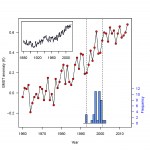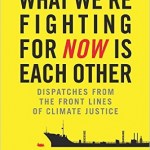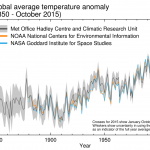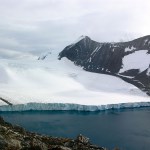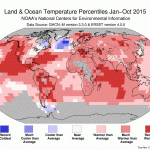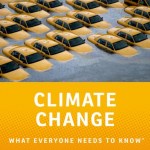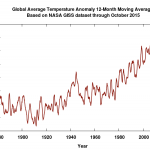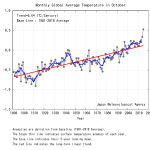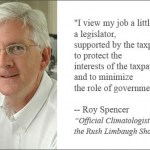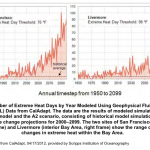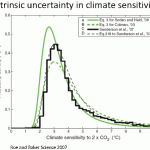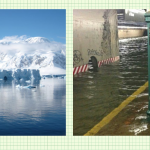Global Warming
This post was written by Peter Sinclair and Greg Laden in response to a recent Wall Street Journal Op Ed piece by Matt Ridley and Benny Peiser.
In a recent Wall Street Journal commentary, “Your Complete Guide to the Climate Debate,”
Matt Ridley and Benny Peiser ask what might make world leaders concerned about the security impacts of climate change. One answer might be the US Department of Defense.
In its 2010 Quadrennial Defense review, Pentagon experts wrote:
“…climate change could have significant geopolitical impacts around the world, contributing to poverty, environmental degradation,…
You've heard much about the so-called "pause" or "hiatus" in global warming.
One of the implications of a multi-year "pause" in global warming is that the science of global warming must be somehow wrong, because with CO2 rising in atmosphere, due to human activity, how can the surface not warm? However, surface temperatures have been rising, but at a somewhat slower rate than at some other times.
The truth is that there is a lot of variation in that upward trending surface temperature value, measured as an anomaly above expected temperatures. Sometimes the variation pushes the rate of…
It is time to update the list of recommended books on climate change and global warming. I assume that with the holidays coming, you will want to give some people some science books, and climate change related books should be near the top of the list for you. I'm doing a separate post on evolution related books, and another on bird and nature books, as well.
I'm going to keep this short and focus on a small number of books. To get on this list the book has to be good and current, with two notable exceptions (see below).
Global Warming Books For Kids
Please Don't Paint Our Planet Pink!: A…
The World Meteorological Organization has announced that they expect 2015 to be the warmest year on record, and that we are in the warmest five year period on record. We are speaking here of global surface temperatures, though similar descriptions probably apply to the upper 2000 meters or so of the ocean as well.
The global average surface temperature in 2015 is likely to be the warmest on record and to reach the symbolic and significant milestone of 1° Celsius above the pre-industrial era. This is due to a combination of a strong El Niño and human-induced global warming, according to the…
A few days ago a team of climate scientists (Catherine Ritz, Tamsin Edwards, Gaël Durand, Antony Payne, Vincent Peyaud, and Richard Hindmarsh) published a study of “Potential sea-level rise from Antarctic ice-sheet instability constrained by observations.”
The study asked how much Antarctic ice sheets might contribute to global sea level by 2100 and 2200 AD. The results contradicted some earlier estimates which are on the high end, but conformed very closely to the current IPCC estimate, raising that number by a negligible amount.
The authors note that rising seas due to global warming is a…
Record daily high and low temperatures happen now and then at a give weather station. In a normal, stable climate the number of record highs and record lows should be about even. But with human-caused global warming, record highs are expected to be more common than record lows. And they are.
Climate Nexus has this handy dandy widget to track record highs and record lows over the previous year.
Click to see the 1950s, when global warming was not as severe at it is today. Then look at the 1990s when things were starting to take off. Then look at the last year.
Here is NCAR's Gerry Meehl…
NOAA has just followed JMA and NASA in reporting on October's average global surface temperature. The surface temperature is the combination of thermometer-at-head-height data and sea surface temperatures, averaged out for the planet. Several groups track this data, and though there is much overlap in the instruments used, each group has its own way of processing the data to eliminate errors and biases, and to adjust for missing information (such as large regions with little data).
NOAA points out that October had the greatest above-average departure from average for any month. Also, NOAA…
There is a new study by a French/English team looking at the rate at which Antarctic glaciers might contribute to sea level rise, due to global warming, between now and 2100 and 2200 AD.
The study produces several estimates, but suggests that glaciers in Antartica might contribute as much as 30 cm by 2100 and 72 cm by 2200. That is a large amount of sea level rise, but it is actually less than other studies that rely more on paleoclimate evidence have suggested. I personally have something of a bias towards paleo evidence; Good paleo evidence is evidence of what actually happened,…
Michael Mann has an editorial on Scientific American's site putting the well known 2.0C limit in perspective for the upcoming climate talks in Paris.
Mann makes a number of important points in his essay (read it here: Meeting a Global Carbon Limit Is Cheaper Than Avoiding One) but there is one point that I want to underscore.
The key factor is that there are technological innovations and economies of scale that emerge only in the course of actually doing something.
Here's the thing. Let's say you were suddenly in charge of one trillion dollars of money that could be used to address climate…
Climate Change: What Everyone Needs to Know® by Joe Romm is just out, and is the most up to date examination of climate change science, the effects of climate change on humans, policy related problems, and energy-related solutions. Everyone should read this book, and if you teach earth system sciences you should consider using this book as a guide in your teaching, or in some cases, assigning it in class. The book is written to be read by general audiences, so it would work well in a high school or college setting.
As Romm points out, climate change will have more of an impact on humans,…
We knew October was going to be hot. Only hours ago the Japanese Meteorological Agency came out with their data showing October 2015 to be the hottest October in their database. I've not checked yet to see if it was the hottest month in their database. October 2015 was the hottest month in that entire database, which goes back to 1891.
October 2015 was the Warmest Month in the Entire NASA Dabase
Now, NASA GISS, which also keeps track of these things, has come out with their numbers. The predictions from experts like John Abraham indicated that October 2015 might be in the 90s (that's the…
The Earth's surface is warming primarily because of human generated greenhouse gasses, mainly CO2, being added to the atmosphere. Several agencies and organizations track this by combining data from surface thermometers and sea surface temperature measurements. The Japan Meteorological Agency is one such group, and they have just released their updated monthly data for October.
The graph above shows the average surface temerature for the month of October for the entire period of their data set (1891 to the present). Not only is October 2015 the warmest October observed, but it is way…
Dr. Roy W. Spencer has a blog and a facebook page, is a famous climate science denier, and, it turns out, an unmitigated ass.
Peter Sinclair notes,
Roy Spencer is of course, most famous for consistently misreading his own data for some decade or more, insisting that the planet was cooling, even during some of the fastest warming trend of the last millennium.
He remains the “official climatologist of the Rush Limbaugh Show”.
Must be a good gig. The wronger you are, the more fans and funding you attract.
And now, following hard on the Paris attacks, he wrote this:
Why ISIS Should Support COP21…
There is a new study out that indicates that the rate at which climate change could occur is much higher than previously known or assumed.
Those of us who study actual (historical) evolution, looking at fossils and geological layers and such, have always known that the possible rates of change in earth systems and biological systems are much higher than what we can estimate by looking at the present day. There are two reasons for this. One is a glitch in the uniformitarianism principle, the idea that processes in the past must have been the same as processes we observe today. The glitch has…
Anthony Watts, the famous climate science denier, is all a titter that he is presenting at the upcoming American Geophysical Union meetings.
First, I want to say, good for you, Anthony. Nothing wrong with a science denier going to a major international meeting that includes a lot of climate science and giving a poster. That is how these things work, this is a place to challenge the science. The establishment will not attempt to keep you away because they want you to be there, to make a contribution. I hope you get a lot of great feedback, and enjoy your trip to San Francisco.
Also,…
Scientists and journalists constantly look for fresh ways to communicate the impacts of climate change. Visualisation of data is now well-known and widely practised. But a new project is doing something a little out of the ordinary: it’s turning climate data into sound.
The idea behind ‘Climate symphony’ is to translate hard data on climate change into a musical composition that engages the public — encouraging people to question their feelings and the stories behind the data, and create a conversation.
In this audio interview we speak to Katharine Round and Leah Borromeo of Disobedient Film…
I'm not going to say anything about this research because I've not read the paper, but it looks important. If someone out there writes something up I'll put a link here.
Here's the deal. Climate sensitivity is, very oversimplified, how much the surface of the planet heats up as we add CO2 and other greenhouse gasses to the atmosphere. More specifically, equilibrium climate sensitivity is the number of degrees C the atmosphere at face height and the sea surface heat up with a doubling of CO2 from pre-industrial levels.
If our atmosphere had just nitrogen and CO2 and that's it, the number…
The following is reposed from here.
More than 1,500 academics from around the world have signed an open letter asking world leaders and delegates to the upcoming United Nations Climate Conference in Paris to take vigorous action now in order to avoid a future of catastrophic global warming.
The letter was initiated by Lawrence Torcello, an assistant professor of philosophy at Rochester Institute of Technology, in conjunction with Australian philosopher Keith Horton, and other colleagues in Australia.
“I am passionate about the topic. This is the moral issue of our time and the greatest…
A recent study that is getting a lot of press suggests that the massive ice sheets of Antarctica are on average growing rather than shrinking, and thus, not contributing to sea level rise. (The authors of the study warn that this will reverse in the near future with global warming.) However, there is reason to believe that these conclusions are incorrect.
Antarctica is the sleeping giant of climate change. Human activity, mainly the release of greenhouse gasses from burning fossil fuels, has been changing the climate rather dramatically for the last few decades, and the consequences of this…
It is the fourth quarter, the team you hate (perhaps the Green Bay Packers) have been winning the whole time, but over the last few minutes your team has scored enough points to be just barely ahead. And, you have the momentum. The other team has many key players out with injuries, your players are really clicking, and all the stats have turned your way. Nothing is assured, but you are likely to win this game (may be you are the Vikings, so this is an extreme event).
But the other team (hey, let's change them from the Green Bay Packers to the New Orleans Saints) is starting to play dirty.…

